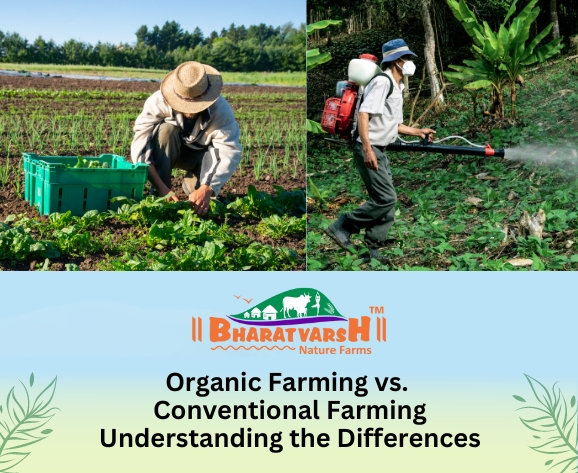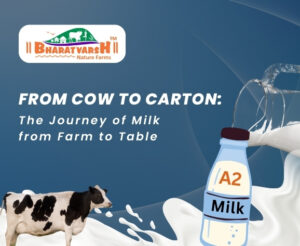What is Organic farming?
Developed as a result of the environmental harm caused by the widespread use of chemical pesticides and synthetic fertilizers, organic farming is the type of farming that uses a sustainable agricultural system. The agricultural system focuses on implementing natural and ecological-based pest control and biological fertilizers. The products used in organic farming are primarily derived from animal and plant wastes and nitrogen-fixing cover crops.
What is conventional farming?
As the name suggests, conventional farming is the prevailing agricultural system in the history of farming. The details of this farming method might vary across different countries, yet the significant characteristics remain the same. These include practicing on a large-scale farm, planting single crops, which are uniform and high-yield hybrid crops, involving heavy pieces of machinery in their farming process, and the extensive use of pesticides, fertilizers, and herbicides.
Differences between Organic Farming and Conventional Farming
The increase in traction towards opting for organic farming makes it necessary for folks to understand the fundamental differences between the two types of farming.
The root of conventional farming is its aim to maximize production and output. It is for this reason that man-made chemical fertilizers, insecticides, pesticides, and GMOs are used, which help in exponentially increasing production. On the other hand, organic farming emphasizes crop rotation, beneficial insect habitat promotion, and manual weed removal to manage pests and weeds organically. It prohibits using GMOs and completely restricts chemical fertilizers and synthetic pesticides.
Conventional farming has far greater potential to negatively impact the environment due to its use of synthetic inputs and intensive farming methods. In contrast, organic farming has as its base the aim to minimize environmental impact by promoting sustainable practices and preserving biodiversity simultaneously. Soil health, prevention of soil erosion, water pollution, and greenhouse gas emissions are all monitored carefully in organic farming.
Short-term benefits are more emphasized in the case of conventional farming, thus making it a more money-based approach to farming. Therefore, it focuses on squeezing as much production as possible, whereas organic farming is more about sustainability and the health of the planet in the long run. It makes use of techniques that reflect its sense of respect toward nature, protect the limited non-renewable resources, and keep them as safe as possible for the coming future generations to use.
Organic vegetables: Are they different?
While many studies have shown considerable differences in the yields obtained by the two different farming methods, the weight of their impacts on human life is still under debate and scrutiny. However, the following are a few pointers to consider when shopping for vegetables and fruits:
Pesticide presence: Since organic farming is done by minimizing the use of synthetic products, it is only natural that the yield obtained by this farming method contains way lower levels of pesticides than conventional farming yields.
Nutritional levels: There have been mixed results in this field since some studies have shown considerable differences between organic and conventional vegetables’ nutrition content. In contrast, some have shown no difference at all. Research subjects are highly variable due to the varieties of soils worldwide.
Personal preferences: Buying organic fruits and vegetables is more about personal belief and philosophy than making a difference. It is the person’s choice to care about themselves, the planet, and humanity as a whole when they opt for organic products. Also, cost plays a significant role in selecting your pantry; organic products are considerably pricier and thus less bought by many people.
Zero Budget Natural Farming
This type of farming involves raising crops without using any fertilizers, pesticides, or other external materials. The word “Zero Budget” stands for the implication that zero cost is processed out in the production of all the crops; this helps not just in cutting the costs from the side of the farmers but also in retaining the soil fertility and ensures a natural, safe and healthy chemical free agriculture.
Agriculturist Padmashri Subhash Palekar introduced the concept of zero-budget farming in the mid-1900s to offer an alternative to the green revolution, which focused mainly on yield and ignored its environmental hazards. Thus natural farming is almost the same as organic farming, with minute differences in their ways of preparing the soil and sowing the crops. The principles of natural farming are to use zero external inputs when farming since it is to be done in harmony with the environment, incorporate the help of animals in the process of farming to make use of whatever they can offer, cover the soil with crops for 365 days and use plant extracts to control the infestation of pests.
The benefits of Zero Budget Natural Farming are far-reaching as it uses upto 50-60 less electricity and water compared to other methods of farming, it also lowers methane emissions into the environment, and the most crucial and productive consequence of this farming is that it saves the farmers from being trapped into debts caused by the expenditure on external inputs. Currently, Karnataka, Himachal Pradesh, Kerala, and Andhra Pradesh are the states actively implementing natural farming in their areas.
Bharatvarsh Nature Farms, located in Nagpur, India, is deeply committed to organic farming. Their dedication to sustainable agricultural practices sets them apart in the industry. By cultivating crops and rearing livestock using natural and environmentally friendly methods, we at Bharatvarsh Nature Farms ensure that our products are of the highest quality and free from harmful chemicals.
At Bharatvarsh Nature Farms, the focus is on preserving and enhancing soil fertility, conserving water resources, and promoting biodiversity. We adhere to the principles of sustainability, striving to strike a balance between agricultural productivity and ecological harmony. By avoiding synthetic pesticides, fertilizers, GMOs, and growth hormones, we cultivate food that is not only healthier and more nutritious but also safe for consumers and the environment.
What makes Bharatvarsh Nature Farms truly exceptional is their unwavering commitment to transparency and integrity. We take great pride in our farming practices and are dedicated to providing consumers with detailed information about our methods, certifications, and products. By choosing Bharatvarsh Nature Farms, you can have confidence that you are supporting a brand that cares deeply about your well-being and the sustainability of our planet.
Contact Bharatvarsh Nature Farms:
You can reach out to us for some useful gardening tips to grow your own organic garden. If you already have one, contact us for supplies of these natural products for your rooftop garden, lawn, or organic farm.
For more details, please visit our website: https://bharatvarshnaturefarms.com/
Write to us at: info@bharatvarshnaturefarms.com or call us at: 91-8603214214, 8650214214
Also Read: THE RISE OF INDIA’S ORGANIC TURMERIC POWDER: ITS REMARKABLE BENEFITS – Bharatvarsh Nature Farms




